
Public debate was already a common practice in South Asian religious and philosophical culture by the time of the Buddha. Often sponsored by local rulers, debate was understood as a method to address different views. Debate became a significant element of Buddhist monastic education as it was thought to deepen one’s understanding of the Dharma through analysis and clarification. And debate was the mechanism by which different Buddhist figures defended and elaborated their doctrines, both with other Buddhists and non-Buddhist figures as well. For Buddhism arose and flourished in a rich and diverse intellectual and religious culture and was constantly engaging with other traditions. We can see the importance of debate in Buddhist traditions in the many texts that are structured as debates, engaging with other Buddhist and non-Buddhist views.
For some Western Buddhists today, debate may be disconcerting. Tolerance is highly valued, inspired perhaps by the notion that there are many different ways to enter a Buddhist path. Moreover, we live in a culture where debate is often about scoring points, a polemical contest associated with sophistry and winning and losing. Indeed, debate can make us feel uncomfortable, as we are so accustomed to experiencing disagreement as a personal rebuke.
At BCBS we are committed to the rich diversity of Buddhist traditions. We offer residential and online programs grounded in the study and practice of Theravāda, Chan, Zen, Himalayan, Pure Land, and other Buddhist traditions as well as making space for new and creative ways of exploring the Dharma and its relevance to contemporary life. Thus, we offer both a path of three multi-month online programs grounded in the teachings of Bhikkhu Anālayo as well as intensive online and residential programs following the teachings of Rob Burbea. We also want to be a place of inquiry, where participants in our programs are invited to learn and investigate for themselves, to discern which practices and teachings are supportive at any particular time on their own individual path of learning and deepening in the Dharma. This is why we are publishing this issue of the Insight Journal dedicated to a debate between Bhikkhu Anālayo on the one hand and Yahel Avigur and Brian Lesage on the other.
This debate is focused on Rob Burbea’s 2014 book, Seeing That Frees: Meditations on Emptiness and Dependent Arising. As readers will see, Bhikkhu Anālayo is concerned that Burbea doesn’t adequately contextualize his approach to emptiness and also is critical of Burbea’s understanding of clinging and perception. Yahel Avigur and Brian Lesage have provided a response. And, because it is common practice in scholarly debates to publish one rejoinder to a rebuttal of a critique, Bhikkhu Anālayo has written a final response. However, I do not believe that this is the last word. The questions raised in this debate, I think, are broader than a discussion of Rob Burbea’s presentation of the path. They are questions about the ways in which contemporary Dharma teachers are simultaneously responsible to classical Buddhist traditions and to contemporary practitioners and how different teachings are presented in a practice context. I hope, then, that these articles and the questions they raise lead to some engaged conversations among both teachers and practitioners.
This past summer, when Yahel Avigur was teaching an emptiness retreat with Tuere Sala based on the teachings of Rob Burbea, I was able to join Yahel and Bhikkhu Anālayo in one of their morning conversations at BCBS. There was much warmth and mutual appreciation. Even as there may be some instances of talking by each other here, it is this image of friendliness with which I would like to end. It is an image of Dharma friends who see things differently, speaking honestly and with a care for each other and a care for discerning how to skillfully teach and practice the Dharma today.
William Edelglass
November 17, 2025